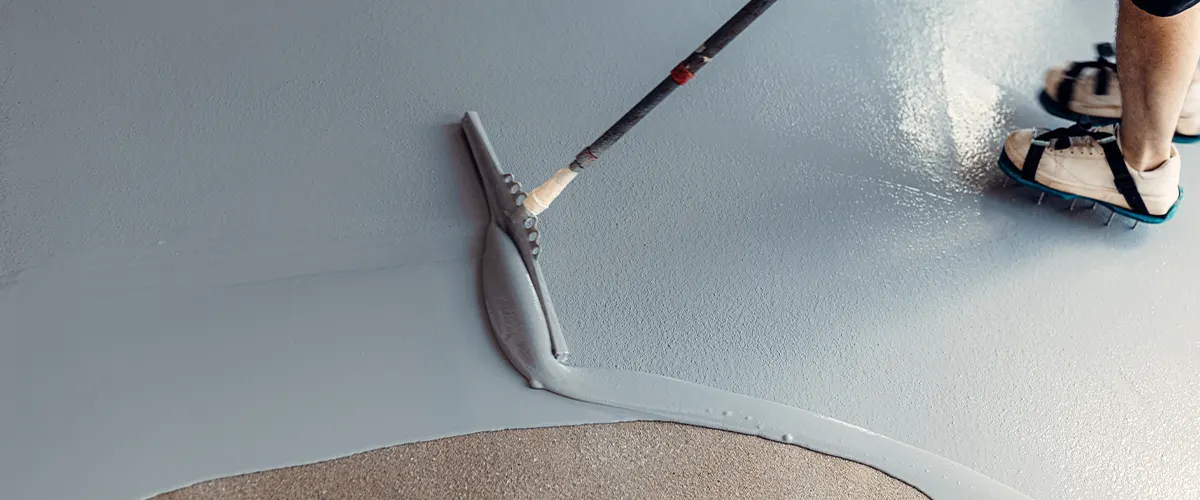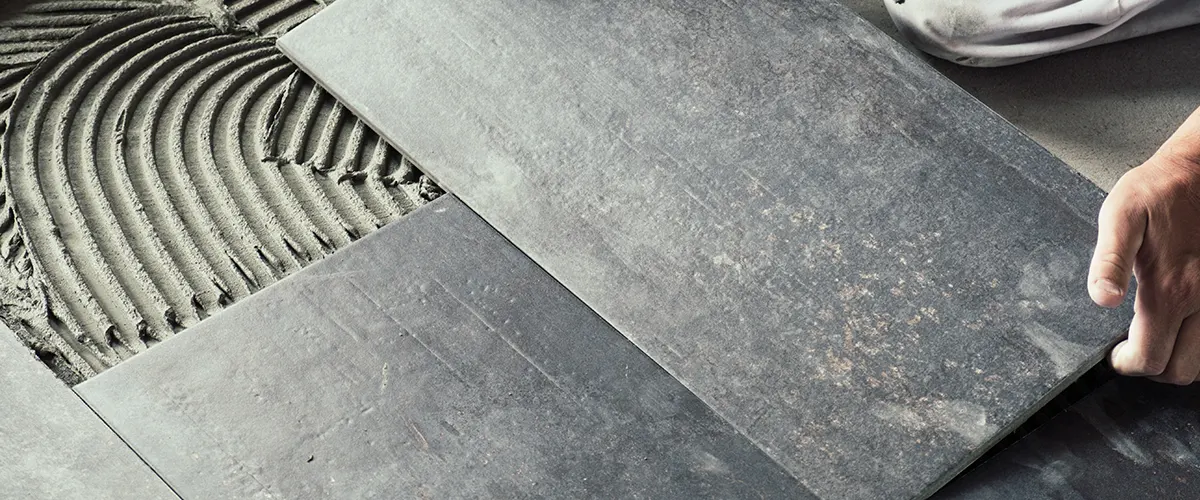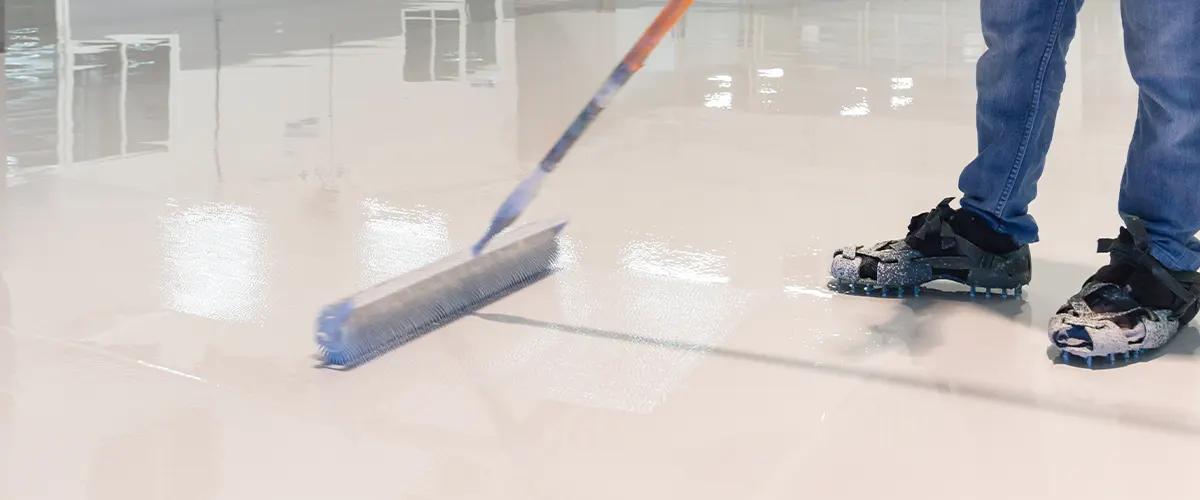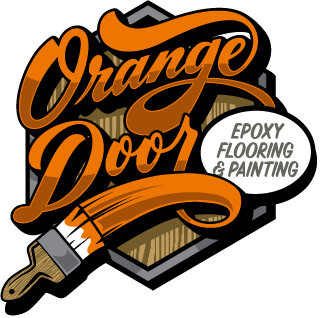It’s time to choose new garage flooring, and you’ve narrowed it down to two options. As the two most common choices, tile and epoxy have been at each other’s throats in the batter for the best garage flooring option. Let’s explore the advantages and drawbacks of each and show you who takes home the title in the battle of tile vs epoxy flooring in garage.
The Pros of Choosing Epoxy Flooring
Epoxy flooring is a well-liked option for use in garages for a number of reasons.
The fact that epoxy flooring is so resistant to wear and tear makes it an excellent choice for use in an area that sees a lot of foot and vehicle traffic, such as a garage. Because it is resistant to stains, chemicals, and scratches, it can tolerate spills of oil, gasoline, and other automotive fluids.
Because epoxy flooring is available in a wide range of hues and patterns, it lets you personalize your garage floor’s appearance to reflect your unique taste. In addition, the shiny finish of epoxy flooring might make your garage look lighter and larger than it actually is.
Epoxy flooring is simple to clean and maintain after it has been installed. To keep the floor clean, you can simply sweep or mop it, and any spills may be readily washed up without leaving any stains behind.
Compared to other floor coating options for garages, such as tile or hardwood, epoxy garage floors offer a more economical alternative. They are a durable choice, indicating that you won’t have to worry about replacing them soon.
Epoxy flooring can also increase safety garage safety by providing a surface resistant to slipping, which can help avoid mishaps that could lead to injuries.

The Cons of Choosing Epoxy Flooring
When considering epoxy flooring for your garage floor, you should be aware that despite its many positive attributes, you should consider some potential negatives.
It may take several days to install epoxy flooring, and the surface must dry completely before it can be walked on. If you need to utilize your garage at that period, this could be a nuisance for you.
You can install this type of flooring using a do-it-yourself kit. However, having a trained professional do the work for the best results is best. This may increase the total cost, but the end results will also be outstanding.
At Orange Door, we offer high-quality epoxy flooring solutions and transparents costs. Let’s have a chat about how to make your garage reflooring budget work for you
Epoxy flooring, while dry, can create a surface that is resistant to slipping, but when wet, it can become exceedingly slippery. This is a potential risk to one’s safety, particularly if one lives in an area that frequently receives snow or rain.
While epoxy is long-lasting, it cannot be described as indestructible. The surface may crack or chip if it is subjected to significant impacts, such as when a heavy tool is dropped.
Epoxy flooring can lose color or fade over time when left in the sun for long periods. This is especially true in areas where there are a lot of windows. Because of this, the floor may take on an uneven tint or yellow with time.
The Pros of Choosing Tile Flooring
The use of tile on the surface of a garage floor can confer a number of advantages.
Tiles are fabricated from materials such as ceramic, porcelain, or natural stone, which are extremely hardy and resistant to the wear and tear caused by heavy foot and vehicle traffic. Natural stone and ceramic tile are the two most common options.
Tile is available in a diverse selection of designs and hues, which means that you may personalize the appearance of your garage floor to reflect your own sense of style. In addition, choosing a tile selection with a smooth and glossy finish may help your garage appear more refined.
Tiled garage floors are usually simple to clean and maintain. To keep the floor clean, you can sweep or mop it, and any spills may be readily washed up without leaving any stains behind.
Because they are resistant to stains and chemicals, tiles are an excellent choice for flooring in garages, which are prone to leaks of automotive fluids and other types of chemicals.
A wide variety of garage tiles are available, many of which are eco-friendly and created from natural resources.
Tiles are a durable material that may be used for garage floors, and if they are properly maintained, they can last for decades. There is a wide variety of tile that is resistant to slipping, which can be an advantage for the safety of your garage.
If you ever decide to sell your home, tiling the garage floor is one thing you can do to boost its value and make it more appealing to people who might be interested in purchasing it.

The Cons of Choosing Tile Flooring
Even while there are numerous advantages to tiling a garage floor, one must also consider the fact that there may be some disadvantages.
Tile is often a more expensive option for garage flooring, especially when compared to epoxy coating.
Tile installation can take several days, which can be inconvenient if you don’t have another spot to park your car or have to use the space during that time.
It is advisable to have a professional install the tile to ensure a high-quality finish; however, this can add to the project’s total cost.
When the tile is subjected to drastic temperature changes or when large objects are dropped on it, it is possible for the tile to crack or chip. In an area like a garage, where people frequently utilize heavy tools and equipment, this can be a cause for concern.
Even though some tiles are resistant to slipping, there are also choices that, when wet, can become quite hazardous due to their extreme slipperiness.
Because of the unevenness of the garage floor, it may be difficult to lay the tiles uniformly, which may lead to a surface that is lumpy or uneven.
There is a possibility that tiling the garage floor will not be possible if the surface is not even. In this scenario, either the floor needs to be leveled or another type of flooring material should be considered.
Can Epoxy Flooring Be a DIY Project?
The installation process of an epoxy floor is typically very cumbersome for homeowners. You definitely want to go with a professional company for such a project.
To carefully prepare the surface of your garage floor and correctly apply the epoxy coating, you should choose a professional installer with the expertise and experience essential for the job. The installation of epoxy flooring requires the use of chemicals, any of which, if not managed correctly, can likely harm you.
A professional has the required safety equipment and is safety-trained. The procedure of installing epoxy flooring can be both time-consuming and strenuous on the body. A professional installer has the tools and equipment to finish the work quickly and effectively without putting unnecessary strain on your body.

Tile Vs Epoxy Flooring in the Garage: The Winner
Epoxy coating can do wonders in the garage. It can make the floor look more consistent and have an unmatched glossy appearance. It’s one of the easiest and most cost-effective ways to make any garage floor appear like part of a luxurious home.
Garage floor epoxy also wins if you want a durable and easy-to-clean floor. It’s very easy for a professional to add epoxy flooring to a concrete floor, with each layer adding more durability and aesthetics.
An epoxy garage floor is almost mandatory if you often end up spilling chemicals on the floor (especially if you like spending time working on your car, motorcycle, or bike). A simple garage floor paint coating isn’t enough to repair the damage caused by these harsh chemicals. Epoxy floors will provide the luxury of fast spill cleaning.
Epoxy floor installation is usually a straightforward process that we’ve tackled successfully almost a thousand times here at Orange Door. We offer epoxy garage floor coating with fast turnaround times.
